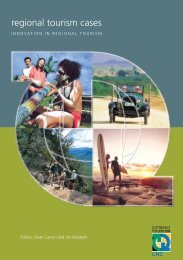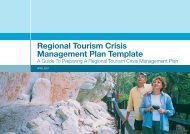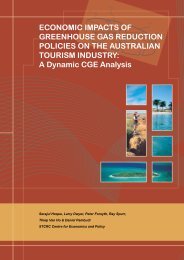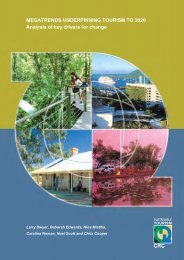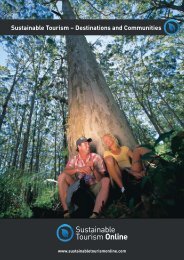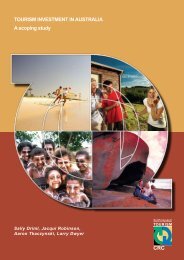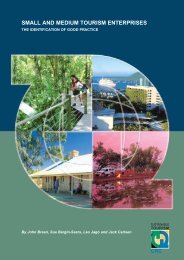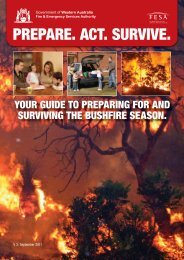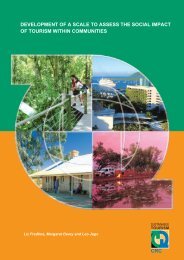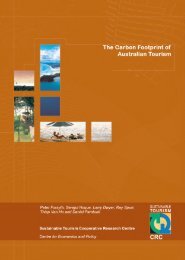Tourism Risk Management - Sustainable Tourism Online
Tourism Risk Management - Sustainable Tourism Online
Tourism Risk Management - Sustainable Tourism Online
Create successful ePaper yourself
Turn your PDF publications into a flip-book with our unique Google optimized e-Paper software.
• Be honest and transparent<br />
To protect your credibility, adopt a policy of full disclosure about what is known and what is not<br />
known. Deliver facts in a non-patronizing manner. Don't try to cover up mistakes, mislead or withhold<br />
critical information. The media will uncover the facts and then make you look dishonest or inept.<br />
Relate to your audience - you are not talking to experts, so communicate your message in terms and<br />
language that people can understand.<br />
• Do not impose a news blackout<br />
Failure to provide information to the media will not only deprive you of the chance to express your<br />
point of view, it will also force the media to seek alternative news sources that may provide<br />
inaccurate information which will be detrimental to the destination.<br />
• Establish a media centre<br />
The media will seek out an authoritative organization for comments and assistance immediately, so<br />
set aside an area they can use that is equipped with desks, phones and data lines. Use it for media<br />
briefings. If the crisis occurs in a remote location, set up a second media centre there with a second<br />
spokesperson who is in constant communication with the headquarters. Work with security or<br />
emergency services to help photographers and camera crews gain photo opportunities.<br />
• Act fast<br />
News travels around the world in a matter of seconds. In order to work effectively with the media, you<br />
need to respond as quickly as they do. Begin to release information once you are ready to answer<br />
the five key questions: who, what, where, when, and why? When accurate, up-to-date information is<br />
not available, say so and promise to get back to the journalists as soon as possible. Set up a<br />
timetable for regular media briefings. Provide background information on your destination.<br />
• Remember the victims<br />
The first communication about the crisis should include information about what is being done to help<br />
the victims. News about economic losses to the tourism industry comes across as insensitive where<br />
loss of life or injury is concerned. <strong>Tourism</strong> is a humane industry and needs to show its<br />
compassionate face in a crisis. As an example: when two French sunbathers were run over during a<br />
police chase recently on Miami Beach, the tourism director immediately arranged to fly in the grieving<br />
parents, he met them personally at the airport and spent the evening with the family in hospital. His<br />
personal involvement, rather than police negligence, was the focus of the story that ran in the<br />
morning newspaper.<br />
• Avoid speculation and categorical reassurances<br />
Speculation about what caused a crisis or who is to blame is not the responsibility of the tourism<br />
operators or industry. Not only would doing so create problems in your relationship with the disaster<br />
management agencies, the media thrives on conflict and will use different messages from different<br />
agencies to suggest conflict or a lack of cooperation, thus creating doubt about the efficiency of<br />
response and recovery operations. It is vital that you don't release any information or provide<br />
comment on any matter concerned with the crisis which is not strictly a tourism responsibility.<br />
• Put the crisis into context<br />
Use maps and statistics to demonstrate that the crisis is limited to a specific area or that it has only<br />
affected a portion of your country’s tourism industry. When highly publicized health problems among<br />
British visitors to the Dominican Republic created a crisis in 1997, part of the recovery strategy was<br />
to demonstrate through statistics that less than one percent of the two million British visitors in the<br />
previous year had fallen ill. This fact emphasized that hundreds of thousands of people had travelled<br />
safely to the Dominican Republic.<br />
<strong>Tourism</strong> <strong>Risk</strong> <strong>Management</strong> – An Authoritative Guide to Managing Crises in <strong>Tourism</strong> 77



